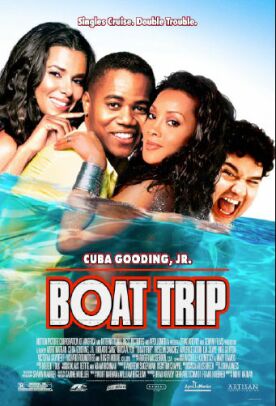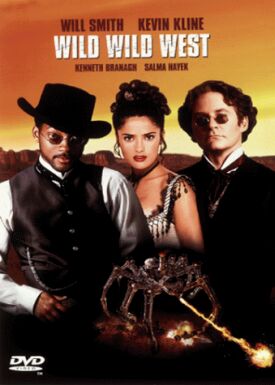Boat Trip
Although Mort Nathan’s Boat Trip, co-written with William Bigelow, may not be the worst movie ever made, in the negative Oscars of my imagination, it would certainly be a nominee in the category of most drearily unfunny comedy. Not just dull but obnoxious too, it offers tastelessness without any point to it. Briefly you might almost suppose that there is some transgressive purpose to its defiant replication of gay stereotypes — to say nothing of Swedish stereotypes — but in the end you are forced to conclude that Messrs Nathan and Bigelow were just too stupid to realize that they were being politically incorrect.
Not that there is not a point to the movie. It is, I take it, to use the stereotype of gay promiscuity — here represented by, of all people, Roger Moore — as a kind of prototype of the healthy sexual self-expression that neither of our two heterosexual protagonists has managed to attain. True, neither the hero, Jerry (Cuba Gooding Jr.), nor his fat, boorish sidekick, Nick (Horatio Sanz), succeeds in being promiscuous. Their attempt at multiple partner, homosexual-style coupling, ostensibly undertaken so that Jerry can forget his bitchy and unfaithful ex-girlfriend, Felicia (Vivica A. Fox), is ironically short-circuited when they are mistakenly booked on a gay cruise in the Mediterranean. But that only teaches them how sex ought to be.
Well, failing the black instructress in how to enjoy Hollywood’s idea of a lusty, healthy sex-life (see Queen Latifah in Bringing Down the House), a gay man — or, better still, a whole ship full of gay men — is obviously the next best thing. Such humor as there is in the feelings of discomfort of heterosexual men in homosexual company is mined with small success. But even if the jokes were better than they are (“You’re light on your feet,” says the dance teacher to Nick. “This whole place is light on its feet,” replies Nick), it would be hard to see quite how Jerry’s and Nick’s inevitable self-realizations have come about.
There is the tolerance angle, of course. Nick, befriended by the drag-queen, Hector (Maurice Godin), tells him that “I thought it was wrong to be friends with a gay man. . .Now it makes me feel like a jerk.” Not, of course, that that stops him from still being a jerk in every other way. But such is his enlightenment that, for a while, Nick begins to think he is gay. Meanwhile, Jerry falls for Gabriella (Roselyn Sanchez), the Latina dance teacher, and must pretend to be gay because she is a poor wounded thing, untrusting of men, who takes a shine to Jerry because she supposes him to be just one of the gays, and therefore unthreatening.
The consequences are, shall we say, predictable. We shouldn’t mind about that so much if the comedic background were funnier. But Nick’s passion for Inga (Victoria Silvstedt), a member of something called the Swedish sun-tan team — which, you may wish to know, the cruise ship picks up on the high seas after he, Nick, inadvertently shoots down their helicopter with a flare gun — is not any more hilarious for the fact that it survives his brief flirtation with homosexuality, or that, in spite of the best efforts of both parties, it remains unconsummated.
Yet to me it is a remarkable tribute to the genre of romance that even the raunchiest of sex comedies still can hardly do without love in some form. Or at least the pretense of love. The trouble is that taking the sin out of sex, which is what the gay subculture in which the action of the film is submerged insists on, also takes most of the kick out of the romance. Jerry and Gabriella are two people, so far as we can see, who “hook up” not out of any stirrings in their respective soul-depths — neither has any soul-depths — but simply out of a mutual sense of each other as the most agreeable of an infinitude of potential partners. To retain its power, romance must begin outside the loins and proceed southwards, but here it, like everything else, begins and ends with sex.
Discover more from James Bowman
Subscribe to get the latest posts to your email.





